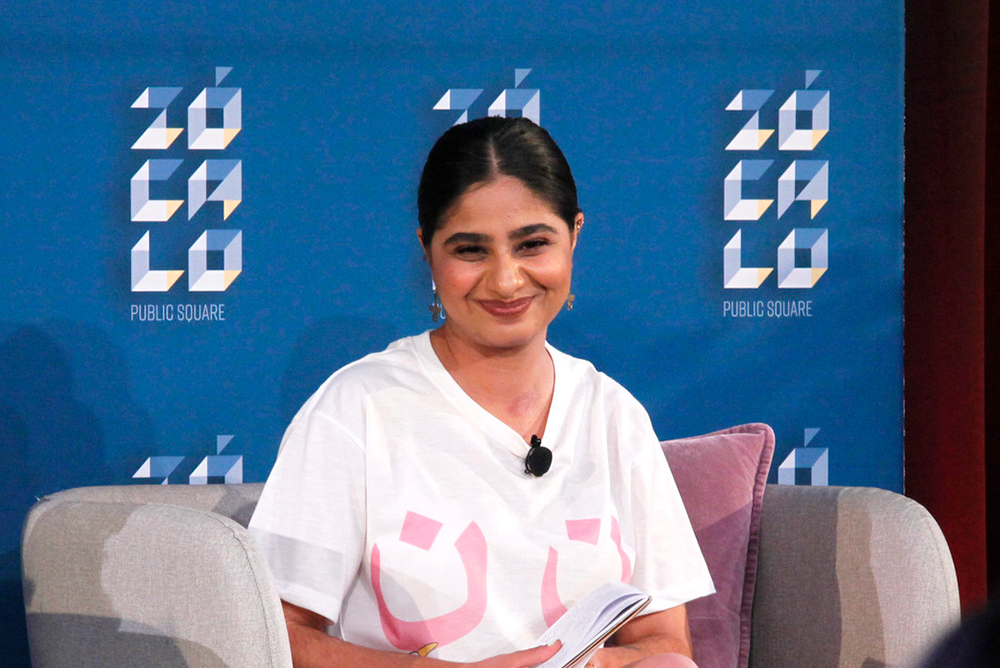
Photo by Aaron Salcido.
Sahar Ghorishi is an Iranian multidisciplinary artist based in London and Los Angeles. The founder of a creative directing platform Journey of/to Dawn, she is a resident artist at the Collective for Black Iranians. Before joining us as a panelist for “How Can Women and Girls Win in Iran?,” a Zócalo event co-presented with the Goldhirsh Foundation and with generous support from Pedram Salimpour, Ghorishi spoke with us in the green room about songs of the revolution, memes, and being a lush human being.
What’s one revolution song that you’ve had on repeat?
“Baraye” by Shervin Hajipour. There’s a remix of it that an amazing artist Danny Asadi has put together with dramatic orchestral music, like the cello, which is such an emotional instrument for me. When I hear that shit, I’m just like, that’s gonna make me cry. It’s really inspired a lot of my artwork that I’ve created for the revolution. So I’m very thankful for him for doing that.
What’s one of your earliest creative memories?
When I was 19 in Iran and under a lot of stress because my aunties kept telling me that I would look so much more beautiful if I changed this about my body, if I got this surgery done, I came back to London. I was super frustrated and I sat in Starbucks and got a piece of paper and a pen and just mood-boarded what I wanted to do. Six months later, The Fall of The Standard of Beauty: The Iranian Nose was created. So that was one of the first ideas I had that literally came to life.
You’ve spoken with your co-founder Saba of Rise Beyond Beauty about how beauty can be anything, and everything. What’s the last beautiful thing that’s caught your eye?
My friend Maya—she’s such a beautiful human being. She cooked for us the other day and everything was so thought out. Everything was so fresh and pure. How I would describe it is lush. She’s a lush human being. She takes all the little things in the world and just puts them together and just serves it to you in such a beautiful way. The way she moves and the way she does things, in regards to cooking or just like speaking or her hand movements or anything. They kind of remind me of my friends in London; so I think that was a beautiful thing to see because it made me miss my people in London, seeing her be the way that she was.
What’s one way that you decompress?
I go on TikTok, and I just laugh my ass off. And memes—I send them to my brother and we both laugh together. Or I’ll just sit with my friends, and we’ll go from my Hinge profile and just laugh at all the comments that people make.
If you were a fruit, what fruit would you be and why?
I would be a fig because I love figs, and I grew up around figs and mulberries. My dad has a little farm in the middle of central Iran, and it’s just full of all these lush fruits. My dad literally got people from Iran to bring branches from those trees to plant in our new garden in London. And so we have mulberry trees and fig trees; they don’t grow that much—there’s only like a couple of them, but when they’re ripe enough, my dad will be like, OK, today is the day, and we’re gonna go pick them. It’s just a beautiful ritual we have, like we’re not able to be there [in Iran] right now, so we’re doing it here in a minimal way. Those are special moments for me with regards to the fruits because they’re so connected to my family and my country.
Do you have a message for the women and girls fighting for their rights in Iran right now?
That everything you do is the most bravest thing ever. And you don’t know how much guilt we feel that we’re not with you in the streets, but just know that myself and whoever I surround myself with, and the people that I wouldn’t necessarily talk to in the West who’s Iranian, we’re all doing the most that we can for you. And everything that we hear from Iran, we immediately, immediately put it out and let the world know what’s going on. Because I feel like the day we stop breathing is a day we will stop speaking for our people on the ground. Like I want them to know that whatever you want, whatever you need, we are here. And we will continue to be spreading the message. And there is no doubt in that.



